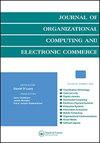Sarima-Based Cyber-Risk Assessment and Mitigation Model for A Smart City’s Traffic Management Systems (Scram)
IF 1.9
4区 管理学
Q3 COMPUTER SCIENCE, INFORMATION SYSTEMS
Journal of Organizational Computing and Electronic Commerce
Pub Date : 2022-01-02
DOI:10.1080/10919392.2022.2054259
引用次数: 6
Abstract
ABSTRACT A malicious hacker can compromise the integrated traffic management systems (ITMS) speed sensors in a smart city, causing a vehicle to misread the speed and result in collision or congestion on the pathways. Based on protection-motivation theory (PMT), we propose a Time series-based Cyber-risk Assessment and Mitigation for smart cities (SCRAM) model comprising three modules for the smart city administrator. In line with the threat appraisal component of PMT, our cyber-risk assessment (CRA) module uses a Seasonal time series forecasting method, takes ITMS average speed as an input, and outputs the probability of anomalies in the average speed of vehicles. Subsequently, based on the concepts of risk theory, the cyber-risk quantification (CRQ) module calculates the expected loss for a smart city due to collision or congestion on the pathways. In line with the coping appraisal component of PMT, our cyber-risk mitigation (CRM) module proposes strategies for the smart-city administrator to reduce cyber-risk using technological means and pass the residual risk to third-party cyber-insurer.基于sarima的智慧城市交通管理系统网络风险评估与缓解模型
摘要恶意黑客可以破坏智能城市中的综合交通管理系统(ITMS)速度传感器,导致车辆误读速度,导致道路碰撞或拥堵。基于保护动机理论(PMT),我们提出了一个基于时间序列的智能城市网络风险评估和缓解(SCRAM)模型,该模型包括智能城市管理员的三个模块。根据PMT的威胁评估组件,我们的网络风险评估(CRA)模块使用季节性时间序列预测方法,将ITMS平均速度作为输入,并输出车辆平均速度异常的概率。随后,基于风险理论的概念,网络风险量化(CRQ)模块计算智能城市因道路碰撞或拥堵而造成的预期损失。根据PMT的应对评估组件,我们的网络风险缓解(CRM)模块为智能城市管理员提出了利用技术手段降低网络风险的策略,并将剩余风险传递给第三方网络保险公司。
本文章由计算机程序翻译,如有差异,请以英文原文为准。
求助全文
约1分钟内获得全文
求助全文
来源期刊

Journal of Organizational Computing and Electronic Commerce
工程技术-计算机:跨学科应用
CiteScore
5.80
自引率
17.20%
发文量
7
审稿时长
>12 weeks
期刊介绍:
The aim of the Journal of Organizational Computing and Electronic Commerce (JOCEC) is to publish quality, fresh, and innovative work that will make a difference for future research and practice rather than focusing on well-established research areas.
JOCEC publishes original research that explores the relationships between computer/communication technology and the design, operations, and performance of organizations. This includes implications of the technologies for organizational structure and dynamics, technological advances to keep pace with changes of organizations and their environments, emerging technological possibilities for improving organizational performance, and the many facets of electronic business.
Theoretical, experimental, survey, and design science research are all welcome and might look at:
• E-commerce
• Collaborative commerce
• Interorganizational systems
• Enterprise systems
• Supply chain technologies
• Computer-supported cooperative work
• Computer-aided coordination
• Economics of organizational computing
• Technologies for organizational learning
• Behavioral aspects of organizational computing.
 求助内容:
求助内容: 应助结果提醒方式:
应助结果提醒方式:


